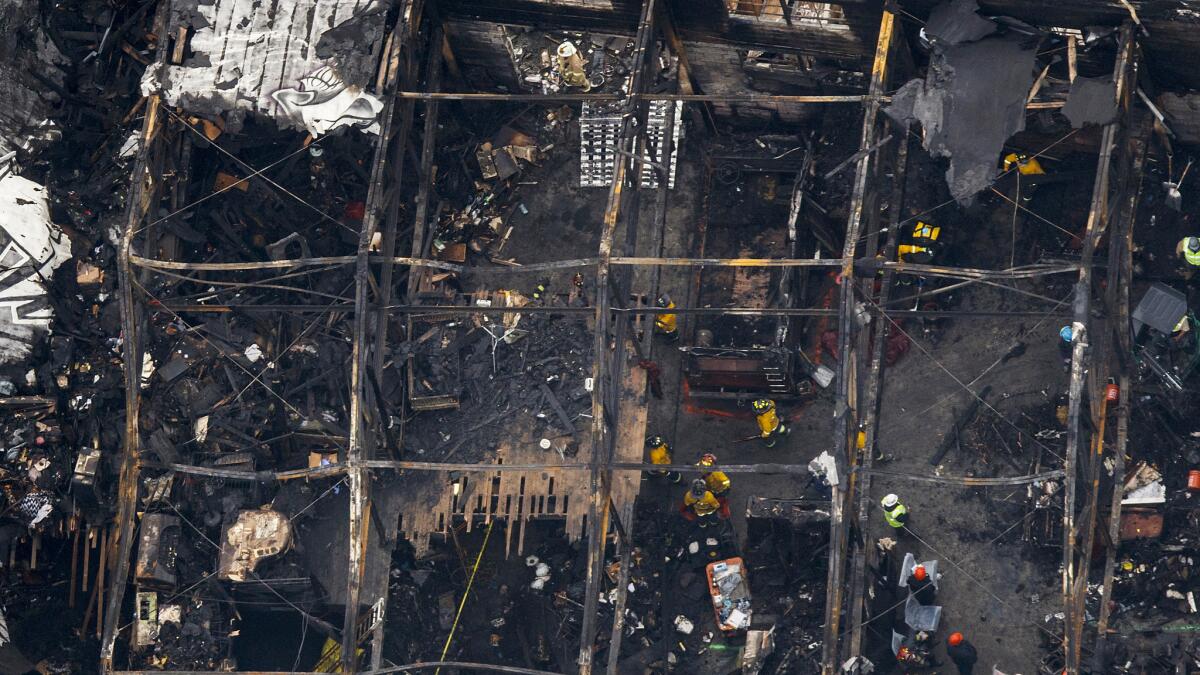Cities try to protect tenants while cracking down on illegal warehouse housing

- Share via
OAKLAND — As officials vow to crack down on illegally converted warehouses in the wake of the deadly Ghost Ship fire, there has been pushback from some tenants and housing rights activists who fear the effort will end up leaving low-income tenants on the streets.
Soaring rents both in the Bay Area and Los Angeles area have pushed countless residents into substandard housing, including makeshift units built illegally in warehouses zoned for commercial uses.
Officials in Oakland and Los Angeles said they are working to blunt the impact of a crackdown on illegal residences.
Los Angeles City Atty. Mike Feuer said Wednesday his office is working on a plan that would require property owners in buildings cited for illegal conversions to pay for the evicted tenants to be relocated.
If owners have “been deriving revenue from tenancies that are unlawful or unsafe, they must find the money,” Feuer said.
At Oakland City Hall, officials are exploring rules similar to New York City’s Loft Law of 1982, which managed the conversion of illegally occupied warehouses to legal loft residences that included rent-control protections for tenants.
“There’s a lot of evictions happening,” Oakland City Councilman Noel Gallo said. “We’re trying to say, ‘Wait a minute, stop, we want to work with you as a property owner to bring your warehouse up to date. Follow the procedures, don’t throw the people out on the street.’ ”
Officials in Los Angeles as well as San Francisco and Oakland are vowing to improve the identification of such warehouses and the closing of properties that pose serious safety risks.
The push comes after 36 people were killed in an Oakland warehouse earlier this month when a fire broke out during a concert. Former residents described the warehouse as a fire trap filled with debris, exposed wiring and substandard construction. Oakland officials said the Ghost Ship warehouse was zoned for industrial use but served as artists’ living quarters and a performance space.
Since the fire, Gallo said, the city has been inundated with inspection requests and information about converted homes, lived in not only by artists but also by immigrant families and college graduates burdened by debt.
“People are willing to pay the price to live just about anywhere they can find a place to live in, and so the property owners are taking advantage of the system,” Gallo said.
Oakland resident Eden Foley, 27, said her friends who live in large warehouses to stay connected to Oakland’s flourishing art scene are scared of eviction.
“A lot of people who are my age, maybe went to college, maybe didn’t, who can’t find very well-paying, stable jobs but don’t want to leave this city,” Foley said. “We shouldn’t be blaming the people who are victims of rising rents. We should be looking at the system that’s creating that disparity.”
Inspectors in Bay Area cities have opened investigations into dozens of buildings, and the Los Angeles city attorney has sued the owner of a warehouse illegally converted to lofts.
Experts said truly cracking down on illegal converted warehouses is going to take time, detective work and likely more resources from municipal governments. Many operators of these warehouses work under the radar, avoiding city permits that would prompt attention from inspectors.
Oakland officials are under growing scrutiny over an apparent lack of inspections of the Ghost Ship before the fire.
Officials revealed last week that no building code enforcement inspector had been inside the warehouse in at least 30 years, despite the fact that the building and its adjoining lot had been the focus of nearly two dozen building code complaints or other city actions.
Fire Chief Teresa Deloach Reed said a review of city records showed that the Fire Department never had any triggers to inspect the property because it never received any complaints.
Tchekmedyian reported from Oakland, Serna and Winton from Los Angeles.
alene.tchekmedyian@latimes.com
UPDATES:
7:35 p.m.: This story was updated with information about Oakland’s plans and background on the Ghost Ship fire.
This story was originally published at 3:20 p.m.
More to Read
Sign up for Essential California
The most important California stories and recommendations in your inbox every morning.
You may occasionally receive promotional content from the Los Angeles Times.
















